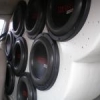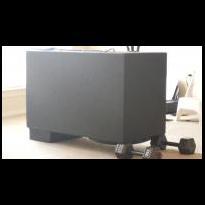Sound quality is accurate reproduction of the source. That's not subjective. Your personal preference is subjective. Is it possible to quantify all aspects of a systems sound quality? Well, theoretically it's probably possible however practically it's pretty difficult. But that doesn't mean you can substitute your personal preference of "sounds good" for accuracy to the source and still call it "sound quality", especially if the measurable properties do not coincide with an accurate reproduction of the source. So judges listening to a system and scoring it based on what they hear is not subjective? Maybe you're the one who should be quiet instead of making such ridiculous and clearly contradicting statements. Good try noobie. But you fail completely. You are incorrectly assuming that sound quality competitions are the epitome of the definition of sound quality. Ideally that would be the case, however it is not. Yes, the judging is left open to the judge's own preference and this is one of the inherent flaws to this competition format. That fact doesn't alter the proper definition of the term "sound quality", it only makes the "competitions" subject to personal preference rather than accuracy to the source. This is a flaw in the format and style of the competition, not in the correct definition of the term "sound quality". The idea of "sound quality" being accuracy to the source extends beyond the arena of car audio. Home audio enthusiasts aren't sitting around biting their nails waiting for the outcome of a car audio SQ competition so they can define the sound quality of their home systems. Most of them scoff at car audio in general given the harsh environment and poor results without major modifications to a vehicle. It doesn't take much more than a modest bookshelf system and subwoofer to surpass high-level car audio systems in most regards. So, to think that car audio SQ competitions define and epitomize the term sound quality is laughable at best. If anything, the term "sound quality" may be a misnomer when being used to describe those competition formats. Your post does nothing but demonstrate your complete ignorance and complete lack of understanding while simultaneously making yourself look like a buffoon. You did however do a great job of inserting your foot in your mouth..... So who's to say if the reproduction of the source is accurate, a machine or a person? Therein lies the subjective nature of SQ so my point is stated correctly, EVERYTHING subjective about that! Your point is incorrectly stated. There are certain practical methods that can be used to objectively gauge accuracy to the source, and other less practical methods that could be employed. But our ability or inability to quantify every aspect of a system doesn't alter the definition of the terms. Sound quality is accuracy to the source. Personal preference is what you are describing. For example, someone might personally like a system with exaggerated low end response and higher 2nd order distortion as this generally sounds pleasing to the ear.....but that doesn't make it accurate to the source, and it doesn't make it anymore "sound quality" just because they like it more. Yet again, you fail. And to answer your question, a machine or quantity of measurements would be best used to identify accuracy to the source. Humans ears are actually pretty lousy, and we are inherently biased and preference based. I'm not saying there is anything wrong with setting up your system based on your personal preference. It's designed for you, and should sound how you want it to sound. But don't confuse your (or anyone else's) personal preference for "sound quality", which is accuracy to the source. They are two different and distinct entities. What sounds best to you may not be the most accurate reproduction of the source.



